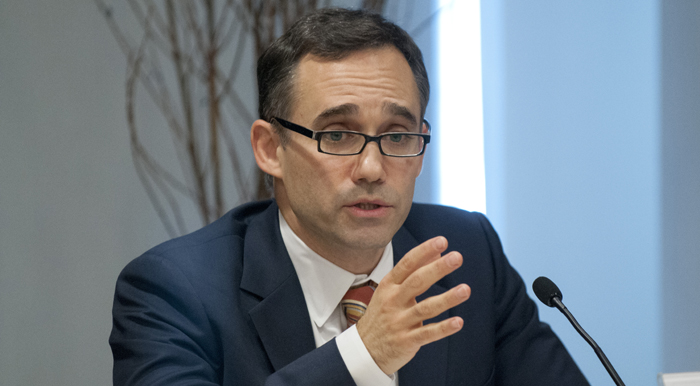
The International Peace Institute launched its latest book, Responding to Genocide: The Politics of International Action, featuring a panel discussion with the editors and others on October 25.
Co-editor Adam Lupel, IPI Editor and Senior Fellow, clarified one aspect of the title early in the event. “When we speak about response, it should be understood that military intervention is one tool among many,” he said. “And that international actors can and should respond to the risks of genocide and mass atrocities long before violence ever takes place.”
Gillian Kitley, Senior Officer at the United Nations Office on Genocide Prevention and the Responsibility to Protect, contended that there are ample opportunities to foresee and mediate these events before they happen. “History has shown that atrocity crimes are processes and not singular events,” she said. “They don’t happen overnight.”
The other co-editor, Ernesto Verdeja, Assistant Professor at the Kroc Institute for International Peace Studies at the University of Notre Dame, spoke about the importance of discrepancies in the definitions of genocide used by courts and international tribunals, advocacy groups, policymakers, and academics.
He said that legal courses of action in response to genocide can be blocked by clashes over what constitutes an ethnic group, as happened with the Tutsi population in Rwanda. Responses can also be bogged down by questions about the intentions of the perpetrators of atrocities.
“’Is that genocide or a really degenerate form of counterinsurgency?’” Dr. Verdeja asked, offering an example of the kind of semantics debate that slows action. “As if these things were exclusive from one another?” he added. These kinds of definitional arguments complicate policymaking, research, and the development of systems of prevention, the panel agreed.
Dr. Verdeja said that although most conflicts in recent years tend to be civil wars and don’t occasion genocide, there are correlations between the causes of genocide and civil war. He said both forms of violence tend to stem from a history of political instability, conflict, and marginalization of groups.
The book’s findings, he noted, also pointed to factors that differentiate the two types of crises. He said the risk of civil war is high in very poor countries with “mixed authoritarian regimes” where similar-sized groups can compete for some amount of political mobility. Genocide, however, arises in fully authoritarian, mid-level-income nations with distinct majority and minority populations.
“Civil wars make genocide much more likely, but of course, not vice versa,” said Dr. Verdeja.
However, the panel agreed that whether it’s deemed genocide or counterinsurgency or civil war, it affects not only those in need of protection but people all over the globe in various ways. Crises create regional insecurity and mass flows of refugees, as well as put into question the ability of the UN Security Council, which is tasked by law with maintaining international peace and security.
Dr. Lupel said that a lack of political will is the biggest obstacle to apt, effective responses to genocide, citing examples in Rwanda, Bosnia, Darfur, and, most recently, in Syria. “Even if we know what needs to be done,” he said, “so often we lack the political will to act in a timely way because of concerns about sovereignty, because of domestic political opposition, because of financial concerns, or other reasons.”
Ms. Kitley argued that, “We’re still least effective when states themselves are the perpetrators of atrocities, and are strong enough and with enough powerful friends to prevent international action—as we are seeing in the case of Syria.”
“National interest rather than moral imperative remains the dominant basis of state action in international affairs,” Dr. Lupel said. “Preventing atrocities should be seen as a vital national interest, common to all.”
The event was moderated by Maureen Quinn, IPI Director of Programs.
Watch event:







